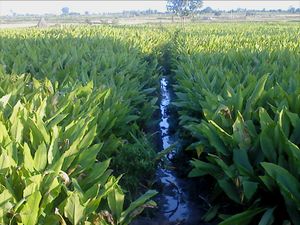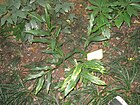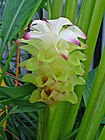Note: This is a project under development. The articles on this wiki are just being initiated and broadly incomplete. You can Help creating new pages.
Difference between revisions of "Curcuma longa - Haridra"
(→List of Ayurvedic medicine in which the herb is used) |
(→References) |
||
| (4 intermediate revisions by 2 users not shown) | |||
| Line 1: | Line 1: | ||
[[File:Turmeric.JPG|thumb|right|''Turmeric'', ''Haladi'', ''Curcuma longa'']] | [[File:Turmeric.JPG|thumb|right|''Turmeric'', ''Haladi'', ''Curcuma longa'']] | ||
| − | |||
'''Turmeric''' is a rhizomatous herbaceous perennial plant of the ginger family Zingiberaceae. It is native to southern Asia, requiring temperatures between 20 and 30 °C and a considerable amount of annual rainfall to thrive. | '''Turmeric''' is a rhizomatous herbaceous perennial plant of the ginger family Zingiberaceae. It is native to southern Asia, requiring temperatures between 20 and 30 °C and a considerable amount of annual rainfall to thrive. | ||
| − | |||
==Uses== | ==Uses== | ||
{{Uses|Psoriasis}}, {{Uses|Warts}}, {{Uses|Alzheimer’s disease}}, {{Uses|Parkinson’s disease}}, {{Uses|Ulcerative colitis}}, {{Uses|Arthritis}}. | {{Uses|Psoriasis}}, {{Uses|Warts}}, {{Uses|Alzheimer’s disease}}, {{Uses|Parkinson’s disease}}, {{Uses|Ulcerative colitis}}, {{Uses|Arthritis}}. | ||
| Line 36: | Line 34: | ||
==Identification== | ==Identification== | ||
===Leaf=== | ===Leaf=== | ||
| − | {{Leaf|Simple| | + | {{Leaf|Simple|Alternate|The leaves are divided into 3-6 toothed leaflets, with smaller leaflets in between}}<ref name="Leaf"/> |
===Flower=== | ===Flower=== | ||
| − | {{Flower|Unisexual|2-4cm long| | + | {{Flower|Unisexual|2-4cm long|Yellow, pink or orange|5|Flowering may occur early in the growing season}} |
===Fruit=== | ===Fruit=== | ||
| − | {{Fruit| | + | {{Fruit|Simple|7–10 mm|Fruiting time is June and July||many}} |
===Other features=== | ===Other features=== | ||
| Line 95: | Line 93: | ||
<references> | <references> | ||
| − | <ref name="chemical composition">[http://www.thepharmajournal.com/vol4Issue1/Issue_Mar_2015/4-1-18.1.pdf | + | <ref name="chemical composition">[http://www.thepharmajournal.com/vol4Issue1/Issue_Mar_2015/4-1-18.1.pdf Chemical constituents]</ref> |
| − | <ref name="Leaf">[https://www.plantdelights.com/blogs/articles/curcuma-longa-turmeric-plant-zedoaria-ginger | + | <ref name="Leaf">[https://www.plantdelights.com/blogs/articles/curcuma-longa-turmeric-plant-zedoaria-ginger Curcuma Morphology]</ref> |
| + | <ref name="Ayurvedic preparations">[https://easyayurveda.com/2013/10/23/turmeric-curcuma-longa-benefits-usage-dose-side-effects/ Ayurvedic preparations]</ref> | ||
| − | <ref name="How to plant/cultivate">[http://practicalplants.org/wiki/Agrimonia_eupatoria | + | <ref name="How to plant/cultivate">[http://practicalplants.org/wiki/Agrimonia_eupatoria Cultivation]</ref> |
</references> | </references> | ||
Latest revision as of 12:32, 21 April 2020
Turmeric is a rhizomatous herbaceous perennial plant of the ginger family Zingiberaceae. It is native to southern Asia, requiring temperatures between 20 and 30 °C and a considerable amount of annual rainfall to thrive.
Contents
- 1 Uses
- 2 Parts Used
- 3 Chemical Composition
- 4 Common names
- 5 Properties
- 6 Habit
- 7 Identification
- 8 List of Ayurvedic medicine in which the herb is used
- 9 Where to get the saplings
- 10 Mode of Propagation
- 11 How to plant/cultivate
- 12 Commonly seen growing in areas
- 13 Photo Gallery
- 14 References
- 15 External Links
Uses
Psoriasis, Warts, Alzheimer’s disease, Parkinson’s disease, Ulcerative colitis, Arthritis.
Parts Used
Chemical Composition
The rhizomes contain curcuminoids, curcumin, cyclocurcumin, bisdemethoxycurcumin[1]
Common names
| Language | Common name |
|---|---|
| Kannada | Arishina, Arisina |
| Hindi | Haldi |
| Malayalam | Manjal |
| Tamil | Manjal |
| Telugu | Haridra |
| Marathi | NA |
| Gujarathi | NA |
| Punjabi | NA |
| Kashmiri | NA |
| Sanskrit | Haridra |
| English | Turmeric |
Properties
Reference: Dravya - Substance, Rasa - Taste, Guna - Qualities, Veerya - Potency, Vipaka - Post-digesion effect, Karma - Pharmacological activity, Prabhava - Therepeutics.
Dravya
Rasa
Tikta (Bitter), Kashaya (Astringent)
Guna
Laghu (Light), Ruksha (Dry)
Veerya
Ushna (Hot)
Vipaka
Katu (Pungent)
Karma
Kapha, Vata
Prabhava
Habit
Identification
Leaf
| Kind | Shape | Feature |
|---|---|---|
| Simple | Alternate | The leaves are divided into 3-6 toothed leaflets, with smaller leaflets in between |
Flower
| Type | Size | Color and composition | Stamen | More information |
|---|---|---|---|---|
| Unisexual | 2-4cm long | Yellow, pink or orange | 5 | Flowering may occur early in the growing season |
Fruit
| Type | Size | Mass | Appearance | Seeds | More information |
|---|---|---|---|---|---|
| Simple | 7–10 mm | Fruiting time is June and July | many | {{{6}}} |
Other features
List of Ayurvedic medicine in which the herb is used
Where to get the saplings
Mode of Propagation
How to plant/cultivate
While preparing the nursery for turmeric production, at the same time we cultivate a green manure crop (Daincha) inthe main field[4]
Commonly seen growing in areas
Tropical area, Southeast asia, Southern australia.
Photo Gallery
References
External Links
- Ayurvedic Herbs known to be helpful to treat Psoriasis
- Ayurvedic Herbs known to be helpful to treat Warts
- Ayurvedic Herbs known to be helpful to treat Alzheimer’s disease
- Ayurvedic Herbs known to be helpful to treat Parkinson’s disease
- Ayurvedic Herbs known to be helpful to treat Ulcerative colitis
- Ayurvedic Herbs known to be helpful to treat Arthritis
- Herbs with Rizhomes used in medicine
- Herbs with common name in Kannada
- Herbs with common name in Hindi
- Herbs with common name in Malayalam
- Herbs with common name in Tamil
- Herbs with common name in Telugu
- Herbs with common name in Sanskrit
- Herbs with common name in English
- Habit - Herb
- Index of Plants which can be propagated by Seeds
- Herbs that are commonly seen in the region of Tropical area
- Herbs that are commonly seen in the region of Southeast asia
- Herbs that are commonly seen in the region of Southern australia
- Herbs
- Zingiberaceae









